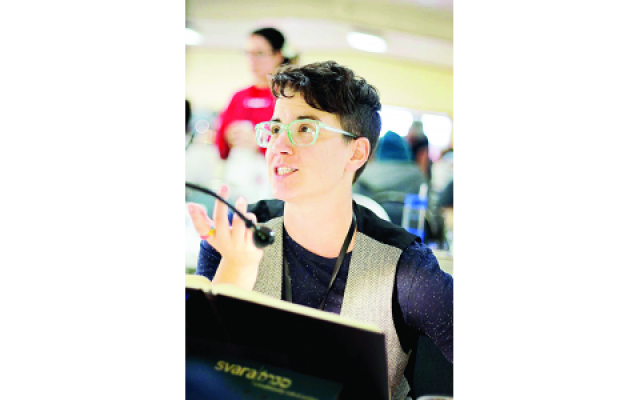What the Talmud Teaches Us About Trusting Children
Neshama Littman is Sunday families director for Jewish Kids Groups.
Lessons from Tractate Yoma
This summer, I had the incredible opportunity to participate in Queer Talmud Camp, a program of the SVARA Yeshiva based in Chicago, led by Rabbi Benay Lappe. Over 100 queer-identified, multi-generational Jews gathered in Northern California and Wisconsin to study Tractate Yoma, the volume of the Talmud that deals with Yom Kippur.
The Mishna that we studied declares that if a person is sick on Yom Kippur, they should be fed, according to the opinion of experts. Given that the dire consequence of breaking the Yom Kippur fast were being subjected to karet (physical and spiritual exile), it makes sense that the Mishna would require an expert opinion to guide the sick person’s actions. But then the Mishna turns around and states that if no experts are present, we give agency back to the sick person and allow them to make their own decision and decide their own fate.
The Gemara goes even further, saying that even if there were 100 experts present, there would be no expertise in the room greater than the sick person’s own experience of their needs. Why do the sick person’s needs override the experts’ opinions? The Gemara uses a phrase from Psalms as the proof text for this surprising assertion: lev yodea marat nafsho, the heart knows the bitterness of its own soul.
I am a queer and trans person who lives with the invisible illnesses of depression and anxiety, and I am all too familiar with the experience of an expert’s opinion overruling my own knowledge of myself. This text is so compelling to me because it offers a radical repudiation of traditional social and religious power dynamics. It not only empowers the sick person to make their own decisions about their health, but also gives them the authority to define their own religious and spiritual experience. It is deeply moving to me that one of Judaism’s foundational texts actively makes space for self-determination and for the subversion of power structures that keep some community members on the margins.
As a long-time educator, this text also got me thinking about my relationship to authority when it comes to teaching children. What would it look like to really trust a child’s knowledge of their own needs? How often do we assert our own expertise as adults to overrule a child? What are we saying when we draw boundaries for children around what a Jewish person is allowed to believe, what a Jewish person is supposed to look like, what conversations are allowed to happen openly in Jewish spaces?
Jewish Kids Groups is creating a culture of education that values children’s authentic experience of their own complicated, dynamic Jewish identities. When a JKG kid bounds to their parents’ car after JKG Sunday, we want them to be burning with questions about what they have learned in class that day. As we prepare for the High Holidays by learning about hachnasat orchim, the Jewish value of welcoming guests, we want kids to go home demanding that our communities make this value alive and visible in the real world, not just in our classrooms and synagogues. Who needs to be welcomed into our sukkah this year?
What can the experience of being vulnerable in our sukkah teach us about what it’s like to live as an unhoused person, or as a refugee forced to flee their home?
May this year deepen your trust in your own expertise, and may we all have the courage to extend that trust even to the youngest members of our community. L’ Shana tova u’metuka from the whole JKG family!




comments